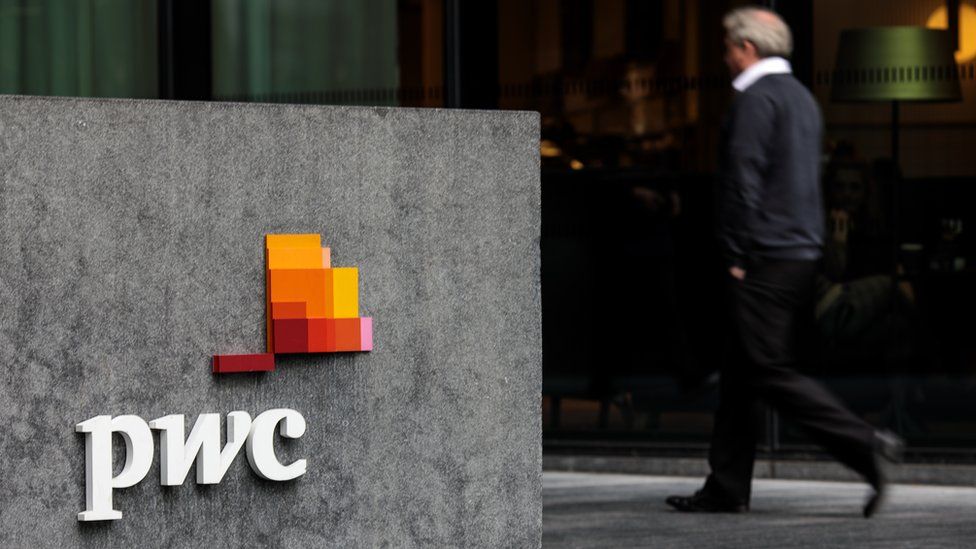PwC says start when you like, leave when you like
- Published
- comments

From now on if you work for PriceWaterhouseCooper you'll be able to work from home a couple of days a week and start as early or late as you like.
This summer you can knock off early on Fridays too.
Following the pandemic the accountancy giant is offering its staff much more control over their working pattern.
PwC chairman Kevin Ellis said he hoped this would make flexible working "the norm rather than the exception".
"We want our people to feel trusted and empowered," Mr Ellis said.
A year of working from home and juggling childcare when schools were closed and other responsibilities mounted, has prompted many businesses to look again at the traditional working week.
The building society Nationwide has told its staff they can choose whether to work at home or in the office. Oil giant BP has told office staff they can spend two days a week working from home and several banks are examining hybrid home-office arrangements.
But PwC is the first of the big four accountancy firms to announce their post-pandemic strategy.
Best new bits
Goldman Sachs' chief executive made clear he saw working from home during the pandemic as an "aberration" saying young employees at the investment bank needed direct contact and mentorship that you could only get in the office.
But Mr Ellis said PwC wanted to retain a mix of working from home and the office.
"Without conscious planning now there's a risk we lose the best bits of these new ways of working when the economy opens up again," he said.
"The future of work is changing at such a pace we have to evolve continually how we do things to meet the needs of our people and our clients."
'Spontaneity'
The pandemic has highlighted many advantages to working from home, the time and expense saved commuting, not having to wear tights or a tie, and a better work-life balance, including spending more time with the children.
But for many the appeal of the zoom-in-a-tracksuit meeting is fading, compared to the idea of water-cooler moments and after-work drinks. They look forward to being back in the work environment, and free from the demands of the children.
Chancellor Rishi Sunak recently suggested that employees might "vote with their feet" if they were required to work from home full time.
He praised the "the spontaneity, the team building, the culture that you create in a firm or an organisation from people actually spending physical time together".
There are the knock-on economic impacts of office life too. City centres full of office workers help support the livelihoods of sandwich sellers, retailers, cleaners and transport workers.
The Canary Wharf financial complex in London currently only has about 6,000 going into work. Pre-pandemic it was 100,000 and the area is packed with shuttered wine bars and restaurants.
Canary Wharf's head of strategy, Howard Dawber, claims people are missing office life, grabbing a coffee, lunch with colleagues and other aspects of city centre life.
Blended approach
In fact only around a fifth of UK workers want to work from home entirely, and around the same proportion want to work only in the office, according to a recent survey carried out on behalf of the World Economic Forum.
They point out that workplaces that operate a "mixed mode" will have to be aware it may have an impact on who gets promoted, with knock on implications for diversity, especially for women.
PwC expect their staff will want the best of both worlds, and will adopt a "blended working" approach, spending around half of their working hours either in the office or at clients' workplaces.
There is an assumption that the majority of people will condense their working week and finish at lunchtime on a Friday during July and August, PwC said.
The new policies will be phased in as lockdown restrictions ease and its 22,000 staff return to the office.
Related Topics
- Published30 December 2020
- Published24 March 2021
- Published30 March 2021
- Published25 March 2021
- Published1 March 2021
- Published8 October 2020
- Published18 March 2021